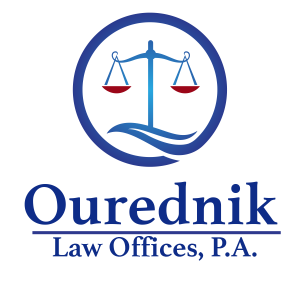Probate is a process supervised by the Florida court system that involves gathering the assets of a decedent, paying their debts, and distributing their assets to their descendants or beneficiaries.
On a state level, it is important to execute the procedure in a manner that will adequately transfer ownership to your chosen designees, yet still retain the control that you worked so hard to establish.
There are two common types of probate administration in Florida, summary administration and formal administration and both require the knowledge of a skilled attorney.
On a federal level, there are numerous pitfalls of the Internal Revenue Code, which can either serve as a boon to the well-prepared or a harsh trap for the unwary. Ourednik Law Offices employs tax professionals who are always prepared to address all of your legal needs on both the state and federal level.
Understanding Probate
The Need For Probate
Whether probate is necessary depends on the circumstances. Some common reasons for probate include:
- When the decedent owned property in their name alone.
- If the decedent had no will, probate is necessary to pass ownership of the decedent’s probate assets to those persons who are the decedent’s heirs under Florida law.
- When the decedent passed with outstanding debts. Probate affords creditors an opportunity to come forward and present their claim for payment from the assets of the estate.
Probate may not be necessary if the decedent owned all of their assets jointly with another party or in designated beneficiary accounts.
Real property held in joint tenancy, payable on death (POD) accounts, health savings or medical savings accounts; life insurance policies; retirement accounts, including IRAs or and 401(k)s; or annuities, are all examples of assets which may not require probate. However, if all of the named beneficiaries listed on the account or policy have predeceased the decedent, or if the decedent didn’t name any beneficiaries, then in most cases the account or policy will need to be probated.
The Probate Process
Before beginning probate, the decedent’s will, if any, and death certificate must be deposited with the clerk of the circuit court for the county in which the decedent lived at the time of their death. A filing fee must also be paid. The clerk will then assign a file number and maintain an ongoing record of all documents filed during the administration of the decedent’s probate estate.
Methods of Probate
Florida recognizes four methods of estate administration:
- Full administration is the longest and most intricate form of probate. In Florida, full administration requires a “personal representative” who serves to administer the estate. If there is a duly executed will that names a personal representative then the individual or individuals who are named will generally serve as personal representative, provided they meet certain statutory qualifications. If there is no will, then the Florida Statutes follow a hierarchy; the surviving Spouse is the first choice, followed by a person selected by a majority interest of the heirs; and then the heir nearest in degree to the decedent’s prior residence. If more than one heir qualifies, then the court may select the best candidate possible. The personal representative may also be a bank or trust company.
- Summary Administration is a form of abbreviated probate that is generally available if the value of the estate (not including property which is exempt from the claims of creditors) is less than $75,000, and if the decedent’s debts are paid, or the creditors do not object. Those who receive nonexempt estate assets in a summary administration generally remain liable for claims against the decedent for two years after the date of death. Summary administration is also available if the decedent has been dead for more than two years and there has been no prior administration.
- Personal Property Disposition Without Administration is available only if the probate estate assets consist solely of property classified as exempt from the claims of the decedent’s creditors by applicable law and non-exempt personal property, the value of which does not exceed the total of (1) up to $6,000 in funeral expenses; and (2) the amount of all reasonable and necessary medical and hospital expenses incurred in the last 60 days of the decedent’s final illness, if any.
- Ancillary Administration is necessary where the decedent resided in another state but owned real property in the State of Florida. In this case, full administration is opened in another state and then a separate administration is opened in Florida to dispose of the real property. The qualifying criteria for ancillary administration tend to be complicated and a Florida attorney should be consulted before proceeding.

Probate Litigation
Probate litigation is a broad area of the law that encompasses court disputes related to issues of the living such as guardianships, conservatorship, powers of attorney, designations of health care surrogates and living wills as well as issues of the deceased such as legal challenges to wills and trusts.
In the State of Florida, clauses in a will which state that a beneficiary or their descendants forfeit their share of an inheritance if they dispute the terms of the will are not given legal effect. Oftentimes, probate litigation can arise despite the presence of a well-structured estate plan. Whatever the reason for your probate litigation issues, Ourednik Law Offices is prepared to represent your interests. The outcome of your probate litigation case is too important to handle alone.
Probate Avoidance
Given the high costs that are commonly associated with probate, individuals are rightfully seeking methods by which to avoid this process altogether.
It is a common misconception that taking probate avoidance measures will negate the need for any form of probate. In many cases, probate administration will still be necessary. The primary goal of probate avoidance planning is to minimize the cost to the estate, maintain family privacy, and get as much of the assets in the hands of the beneficiaries as soon as possible. Whatever issues remain may be subject to probate, but the hope is that the effects will be minimal.
The Cost Of Probate
Section 733.6171(3) of the Florida Statutes outlines the amount that is presumed to be reasonable compensation for attorneys representing a personal representative in a formal estate administration.
Currently, these amounts are:
- $1,500.00 for estates of less than $40,000.00.
- $2,250.00 for estates of greater than $40,000.00 but less than $70,000.00.
- $3,000.00 for estates of greater than $70,000 but less than $100,000.00.
- Three percent (3%) of the value of the estate greater than $100,000.00 but less than $1 million.
- Two and one-half percent (2.5%) of the value of the estate greater than $1 million but less than $3 million.
- Two percent (2%) of the value of the estate greater than $3 million but less than $5 million.
- One and one-half percent (1.5%) of the value of the estate greater than $5 million but less than $10 million.
- One percent (1%) for everything above $10 million.
Common Forms Of Probate Avoidance
- Jointly Owned Property:When two or more people acquire property, they may hold title to that property in several different ways, each of which will have a different impact on their relationship and provide different benefits to the owners. Where probate avoidance is a primary goal, there are two forms of joint ownership commonly recognized in Florida that may be beneficial. These are known as “joint tenants with rights of survivorship” and “tenancy by the entirety (TBE).” Under a joint tenancy with rights of survivorship arrangement, each person is considered to be an owner of the “entire” property interest, together with the other owners(s). This means that if one owner dies, the property will not be transferred by will or probate. Instead, title remains in the surviving owner(s). A tenancy be the entirety arrangement is a special form of joint tenancy reserved only for married spouses. TBE has much the same probate avoidance features as joint tenancy with rights of survivorship, in that the death of one spouse will automatically vest title in the surviving spouse, without the necessity of a will or probate. Many different kinds of property, including real property, personal property, and bank or brokerage accounts may be held as joint tenants with rights of survivorship or TBE, provided the property legal procedure is followed.
- Life Estates A life estate is an interest in real or personal property that is limited in duration to the lifetime of its owner or some other designated person or persons (commonly referred to as the “measuring life”). When the person whose life is the measuring life dies, the property is transferred to a remainder person without the requirement of a will or probate. Life estates are often created through the use of a deed, trust agreement, or some other document that establishes an ownership in property. A life estate may be freely sold, gifted, or otherwise transferred by the owner. However, practically the sale of a life estate for significant value is often difficult to accomplish because the buyer can only purchase the same interest as the owner, which means the buyer will cease to own the interest upon the passing of the measuring life.
- Beneficiary DesignationsAlso may be known as payable on death (POD) or transfer on death (TOD) accounts. Beneficiary designation arrangements are commonly established on bank accounts, brokerage accounts, life insurance policies, and retirement accounts. In this arrangement, assets are disbursed to the designated beneficiary upon the death of the individual, without the need for a will or the probate process. This valuable service is often offered free of charge by most financial institutions and should be established and reviewed frequently by the account or policy owner.
- Living Trusts: A very common method of probate avoidance is the use of a revocable living trust. A person who establishes a revocable living trust (commonly referred to as a “settlor” or “grantor”), may freely make changes to the provisions of the trust, as well as transfer assets into and out of the trust, during their lifetime. Upon the death of the settlor, the revocable trust is usually designed to become irrevocable and any trust assets are distributed according to the terms of the trust document. Often, the settlor serves as the trustee of their revocable living trust during their lifetime, with a successor trustee taking over in the event of death and serving a function that is akin to that of a Florida “personal representative” (also known as an “executor”).
- Revocable living trusts are considered beneficial for estate planning because, when the trust is fully funded, the assets that are owned by the trust pass to the beneficiaries named in the trust agreement (or to trusts for their benefit) without the need for probate. This probate avoidance means that revocable trusts are effective at maintaining the privacy of the decedent and can also save the estate time, court costs, and attorneys’ fees.
How We Can Help You

If you're trying to determine the best way to address or avoid probate, start by speaking with a knowledgeable Florida estate planning attorney. It is usually a very bad idea to start titling property or establishing trusts without consulting with a professional because each of the methods described above can lead to legal results that may be either positive or negative, depending on the individual and their personal circumstances.
Many of our clients are troubled when confronted with the possibility handing 3% or more of their family estate over to an attorney at a time when their families can use it most. Thankfully, Ourednik Law Offices is able to help them by recommending and implementing probate avoidance measures.
Schedule your probate review consultation today.

